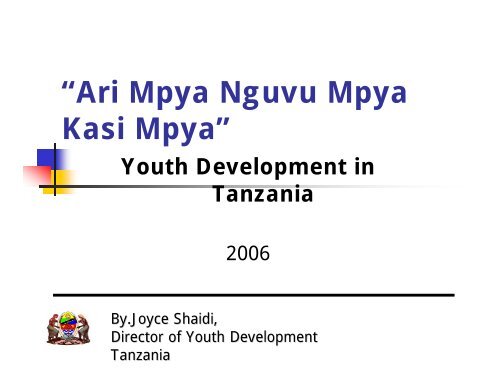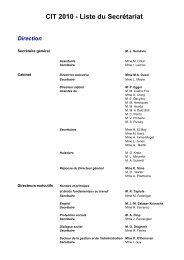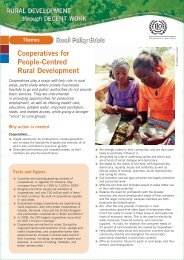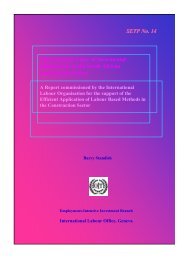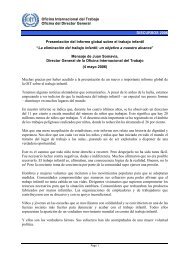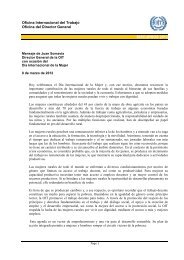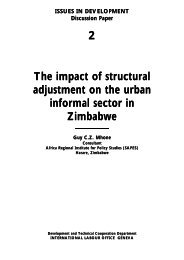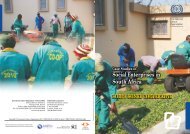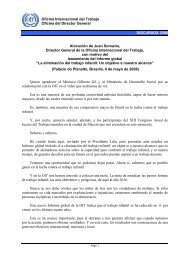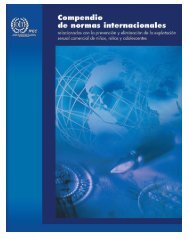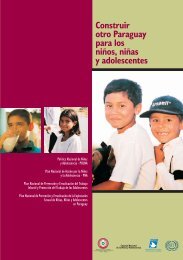âAri Mpya Nguvu Mpya Kasi Mpyaâ - International Labour Organization
âAri Mpya Nguvu Mpya Kasi Mpyaâ - International Labour Organization
âAri Mpya Nguvu Mpya Kasi Mpyaâ - International Labour Organization
Create successful ePaper yourself
Turn your PDF publications into a flip-book with our unique Google optimized e-Paper software.
“Ari <strong>Mpya</strong> <strong>Nguvu</strong> <strong>Mpya</strong><br />
<strong>Kasi</strong> <strong>Mpya</strong>”<br />
Youth Development in<br />
Tanzania<br />
2006<br />
By.Joyce Shaidi,<br />
Director of Youth Development<br />
Tanzania
Specific Situation of Youth in<br />
Tanzania<br />
• The total population of Tanzania is 34 million. 33 %<br />
of the total population is Youth, and 68 percent of<br />
the active labour force is young people.<br />
• A youth in Tanzania is defined as a person<br />
between the ages of 15-35 years.<br />
• The core problem facing youth in Tanzania is<br />
unemployment. This problem is characterized by<br />
lack of job opportunities in urban areas, and underutilization<br />
of the majority of the national labour force<br />
in the rural.
• Youth from primacy, secondary and high learning<br />
institutions entering the labour force annually is about<br />
700,000 but only 40,000 get employment into formal<br />
sector.<br />
• The incidence of unemployment among the youth is<br />
relatively high. The youth constitute 60 % of all people<br />
who are unemployed.<br />
• According to labour Force Survey 2001 unemployment<br />
rate for the whole country is 12.9 percent. Almost half of<br />
the unemployed live in urban areas. 46.5 percent of<br />
active people in Dar es Salaam is unemployed,<br />
unemployment for the other urban areas is 25.5 percent,<br />
and for rural areas is 8.4 percent.
Specific Situation of Youth in Tanzania<br />
• Unemployment for people aged 18-34 was 8.6 in the<br />
rural areas and 41.4 per cent in the urban areas. The<br />
youth aged between 15 and 34 years are more<br />
vulnerable to unemployment.<br />
• Rural youth grow up in a culture that does not typically<br />
support entrepreneurship. They often seek employment<br />
by migrating to nearby cities and town. When they could<br />
not find jobs in town they engaged in dangerous<br />
behaviors such as petty theft, armed robbery, drug<br />
abuse and unsafe sex, which cause other social problem<br />
like spread of HIV/AIDS among youth, family crises,<br />
mental disease, and deaths.
High prevalence of HIV/AIDS<br />
• The HIV/AIDS pandemic is a threat to socio-economic<br />
development in Tanzania. An estimated 1.5 million<br />
Tanzanians are infected with HIV, which will progress to<br />
AIDS and eventually result in death.<br />
• According to 2002 Behavioural Surveillance Survey<br />
among Youth, during the year 2001 a total of 14,112<br />
AIDS cases were reported to the National AIDS Control<br />
Program (NACP).<br />
• Most AIDS cases fall within the age group 20-49 years<br />
with highest number of reported cases in the age group<br />
25-34 and 30-39 for female and males respectively.<br />
Youth aged between 15 – 24 years contributed to 15%<br />
of the total cases.
CONSTRAINTS AND CHALLENGES<br />
• Education System<br />
The number of primary school leavers is big and<br />
has not been followed by a corresponding<br />
expansion of the secondary education. Very few<br />
have been absorbed in secondary school (about<br />
10 per cent).
• Lack of Skills and Business Training<br />
At the time youths complete primary or secondary<br />
education they do not have adequate skills that they can<br />
use to start self employment activities. There are few<br />
secondary schools that have business and commercial<br />
courses for students but the weakness is however that<br />
they emphasis on theoretical courses.<br />
• Inadequate credit facilities<br />
Many youths have started self-employment<br />
opportunities but lack start up capital. Financial<br />
institutions usually have difficult conditions,<br />
which are almost impossible to be met by youths.
• Emphasis on the formal sector alone<br />
The formal sector has not been able to absorb the<br />
majority of the unemployed youths. Various studies<br />
(Bagachwa, 1991, Luvanga, 1994 (have shown the<br />
potential of the informal sector in creating employment<br />
opportunities for youths.<br />
• Non-attractive agricultural sector and the<br />
rural areas in general<br />
The rural areas and the agriculture sector in particular<br />
are currently not attractive to youths. The hand-operated<br />
hole has remained the main farm implement for working<br />
the soil and has, for a long time now, rendered<br />
agriculture a difficult task.
• Gender Imbalance<br />
This attitude is however slowly changing and<br />
women are increasingly becoming active in the<br />
labour force.<br />
Gender mainstreaming in all youth programmes<br />
is required<br />
• Inadequate Information<br />
Youth information is inadequate in coverage, gender<br />
insensitive and lack standards for statistics.<br />
• Inadequate Infrastructure<br />
Inadequate Infrastructure in rural areas encourages<br />
youth to migrate to urban areas intensifying the problem<br />
of unemployment in urban centres.<br />
• Inadequate skills on youth work among VEO WEO and District<br />
officials
• Globalization<br />
The transition to the free market system has resulted in<br />
the privatization of many public institutions. Since the<br />
capacity to make profit depends on low operational<br />
costs, employers often hire the minimum number of<br />
workers to maximize their profit.<br />
• Lack of youth friendly services<br />
Community leaders have a tendency to ignore<br />
youth issues, hence make unfriendly<br />
environmental which hinder youth development<br />
opportunities.
Lack of youth friendly services
POSSIBLE MEANS OF OVERCOMING<br />
THE PROBLEMS<br />
• To link youth development with government, local<br />
government structures at all levels and sectors.<br />
• To strengthen and expand vocational training in public<br />
and private training centers with a dual purpose of<br />
industrial and self-employment.<br />
• To link HIV/AIDS campaign with youth employment<br />
campaign.<br />
• To advise and build capacity of youths on how to secure<br />
loans from financial institution, private firms and Donors.
POSSIBLE MEANS OF<br />
OVERCOMING THE PROBLEMS<br />
• To start a special fund for the purpose of<br />
covering training cost and providing loans for<br />
self-employment activities.<br />
• To emphasize practical and appropriated<br />
education and counseling in- and out- school<br />
with an objective of preparing youths for selfemployment<br />
activities.<br />
• To establish youth information centers starting at village<br />
level and to promoting youth programs through Media.
POSSIBLE MEANS OF OVERCOMING<br />
THE PROBLEMS<br />
• To insist on gender balance and mainstreaming in all<br />
youth development programs.<br />
• To pay attention for the groups with special needs<br />
particularly for youths living in the rural areas.<br />
• To use YES and YEN Networks framework as well as<br />
to effectively implement priority areas in the World<br />
Programme of Action on Youth (WPAY) 2000 and<br />
Beyond
POSSIBLE MEANS OF OVERCOMING<br />
THE PROBLEMS<br />
• To work towards fulfilling the UN Millennium<br />
Development Goals (MDGs) especially goal #8 which<br />
emphasizing Global Partnership as well as to<br />
mainstream youth issues in all UN-MDGs.<br />
• To provide seminars and workshop for Government<br />
leaders so that they can understand how to solve<br />
current cross cutting issues-mainstreaming youth<br />
issue.
ACTION TAKEN AND THE NEED<br />
OF INCREASING COMMITMENT<br />
ON YOUTH EMPOWERMENT<br />
Tanzania has initiated the establishment<br />
of YES Country Network (YES-<br />
Tanzania).<br />
The process started by 50 youth related<br />
organisations with a support of the<br />
South Korean Embassy in Tanzania.
Establishment of YES Country<br />
Network in Tanzania
Members of YES Country Network<br />
YES Country Network comprises of representatives over<br />
250 different NGOs including:<br />
• Government, <strong>International</strong> and Religion Institutions<br />
• Educational and Vocational Institutions<br />
• Financial institutions,<br />
• Youth Groups,<br />
• Private Sectors,<br />
• Media organizations<br />
• Other Diverse Stakeholders.
Policies and National<br />
Strategies<br />
• Vision 2025 ,Poverty Eradication Strategy, MKUKUTA<br />
• The National Employment Policy<br />
• The Youth Development Policy<br />
• The Local Government Reform Agenda<br />
• National Population Policy<br />
• Agriculture Policy<br />
• Small Enterprise Policy<br />
• MKURUBITA<br />
The Youth Development policy and the National<br />
Employment Policy are currently under review to take<br />
into<br />
consideration the globalization and National Vision 2025<br />
Poverty Reduction Strategy.
The YES 7Es and YEN AREAS<br />
• Employability<br />
• Equal opportunities<br />
• Entrepreneurship YEN<br />
• Employment creation YES<br />
• Education<br />
• Empowerment<br />
• Environmental sustainability
ACHIEVEMENTS –Youth<br />
Empowerment<br />
Economic Empowerment<br />
• Availability of Youth Credit Fund<br />
• Financial institutions have demonstrated an interest /<br />
issue loans to the youth groups.CRDB, NMB<br />
• Increased of youth income generation activities.<br />
• Establishment of Small Enterprises Policy<br />
• Increasing of Vocational Training Centre<br />
• Establishment of <strong>Labour</strong> Exchange Centre.<br />
• Establishment of youth working premises and markets.
ACHIEVEMENTS<br />
EDUCATION/ EMPOWERMENT<br />
• Introduction of parenting skills<br />
• Increasing number of NGOs, which provide life<br />
skills for young people<br />
• Increasing the number of education facilities and<br />
number of youths entering Secondary School .<br />
• Establishment of youth NGOs directory<br />
• Establishment of youth centres at ward level
ACHIEVEMENTS<br />
• Empowerment/Youth Participation<br />
• Youth participating in out door life activities at Marangu-Kilimanjaro<br />
outward bound.<br />
• Involvement of young people in the preparation of Poverty<br />
Reduction Strategy Program.<br />
• Establishment of National Youth Week<br />
• Increased local and international exchange program.<br />
• Establishment of youth friendly services in many sectors.<br />
• Formation of Rural Youth ICT Centre in Kilosa, Morogoro region<br />
www.infoyouth.or.tz<br />
• Involvement of young people in the preparation of National Youth<br />
Development Policy<br />
• Increased of Youth NGOs and Youth Groups.<br />
• Youth Participation in local government structures
Youth participation-<br />
<strong>International</strong> Forum
Gender Equity<br />
ACHIEVEMENTS<br />
• Enactment of Sexual offences Act 1998.<br />
• Introduction of women/girls special education program<br />
at high learning institutions.<br />
• Promotion of gender equity in school.<br />
• Campaign against genital mutilation<br />
• Awareness of women's right.<br />
• Promotion of decent work for young women<br />
• Establishment of Young Women NGOs and Women<br />
Networks.
ACHIEVEMENTS<br />
Empowerment/Health<br />
• Strong campaign against HIV/AIDS<br />
• Increased number of youth NGOs, which provided<br />
adolescent reproductive health education<br />
• Establishment of drug abuse prevention programs and<br />
rehabilitation youth centers<br />
• Establishment of youth medical friendly centers.
YOUTH MAINSTREAMING IN NATIONAL<br />
DEVELOPMENT AGENDA<br />
Director of Youth Mrs. Joyce<br />
Shaidi motivating youth to<br />
become more active on Youth<br />
Policy Review Workshop in Tanga<br />
region, 2004<br />
Ms. Asia Mohamed from<br />
Zanzibar insisting gender<br />
equality in the National Youth<br />
Forum on Youth Employment in<br />
Dar es Salaam, 2002
CONCLUSION<br />
• Sub-regional partnership will pave the<br />
way to the green future of youth if we<br />
will put the ideas into the actions.<br />
• Let us measure our success by<br />
demonstrating what we have done rather<br />
than what we know
END<br />
• THANK YOU


